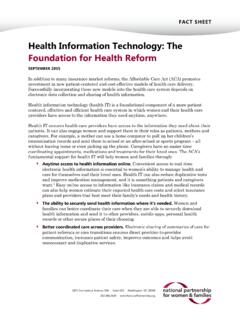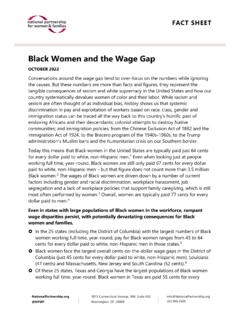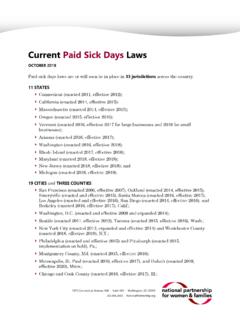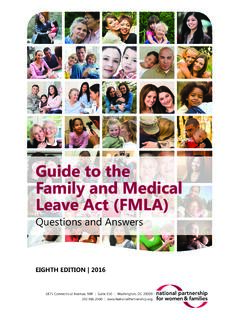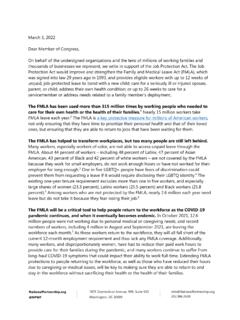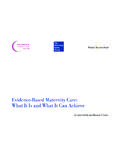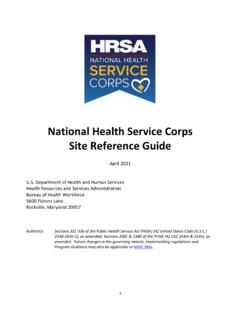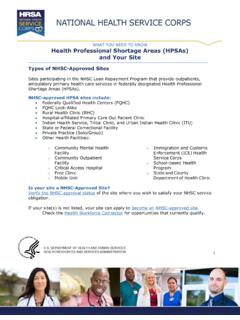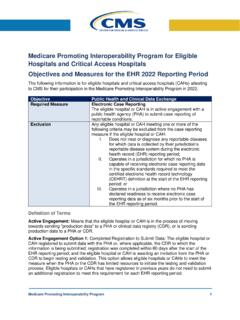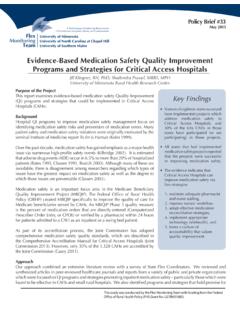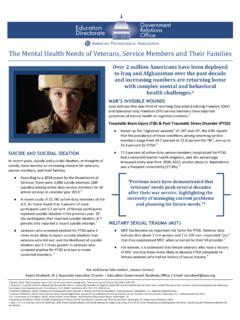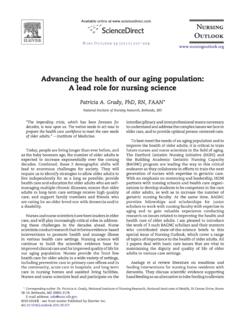Transcription of Black Women’s Maternal Health Issue Brief
1 Issue Brief . Black Women's Maternal Health : A Multifaceted Approach to Addressing Persistent and Dire Health Disparities APRIL 2018. Black women in the United States experience unacceptably poor Maternal Health outcomes, including disproportionately high rates of death related to pregnancy or childbirth. Both societal and Health system factors contribute to high rates of poor Health outcomes and Maternal mortality for Black women, who are more likely to experience barriers to obtaining quality care and often face racial discrimination throughout their lives. Due to racism, sexism and other systemic barriers that have contributed to income inequality, Black women are typically paid just 63 cents for every dollar paid to white, non-Hispanic men. Median wages for Black women in the United States are $36,227 per year, which is $21,698 less 1.
2 Than the median wages for white, non-Hispanic men. These lost wages mean Black women and their families have less money to support themselves and their families, and may have to choose between essential resources like housing, childcare, food and Black women are three to four Health care. times more likely to experience a pregnancy-related death than white These trade-offs are evident in Black women's women. Health outcomes and use of medical care. Compared to white women, Black women are more likely to be 2. uninsured, face greater financial barriers to care 3 4. when they need it and are less likely to access prenatal care. Indeed, Black women experience higher rates of many preventable diseases and chronic Health conditions including higher rates of 5. diabetes, hypertension and cardiovascular disease.
3 When, or if, Black women choose to become pregnant, these Health conditions influence both Maternal and infant Health outcomes. 1875 Connecticut Avenue, NW | Suite 650 | Washington, DC 20009. | To improve Black women's Maternal Health , we need a multi-faceted approach that addresses Black women's Health across the lifespan, improves access to quality care, addresses social determinants of Health and provides greater economic security. Background: Black Maternal Health disparities Too many Black women are dying in pregnancy and childbirth. Black women in the United States are 6. more likely to die from pregnancy or childbirth than women in any other race group. `` Black women are three to four times more likely to experience a pregnancy-related death than 7. white women. `` Black women are more likely to experience preventable Maternal death compared with white 8.
4 Women. 9. `` Black women's heightened risk of pregnancy-related death spans income and education levels. Black women experience more Maternal Health complications than white women. Black women are more likely to experience complications throughout the course of their pregnancies than white women. `` Black women are three times more likely to have fibroids (benign tumors that grow in the uterus and can cause postpartum hemorrhaging) than white women, and the fibroids occur at 10. younger ages and grow more quickly for Black women. `` Black women display signs of preeclampsia earlier in pregnancy than white women. This condition, which involves high blood pressure during pregnancy, can lead to severe 11. complications including death if improperly treated. `` Black women experience physical weathering, meaning their bodies age faster than white women's due to exposure to chronic stress linked to socioeconomic disadvantage and 12.
5 Discrimination over the life course, thus making pregnancy riskier at an earlier age. Black -serving hospitals provide lower quality maternity care. Seventy-five percent of Black women 13. give birth at hospitals that serve predominantly Black populations. `` Black -serving hospitals have higher rates of Maternal complications than other hospitals. They also perform worse on 12 of 15 birth outcomes, including elective deliveries, non-elective 14. cesarean births and Maternal mortality. Many Black women have a difficult time accessing the reproductive Health care that meets their needs. access to reproductive Health care, which helps women plan their families, improves Health outcomes for women and children. 15. `` Black women experience higher rates of unintended pregnancies than all other racial groups, 16.
6 In part because of disparities in access to quality contraceptive care and counseling. 17. `` Many Black women lack access to quality contraceptive care and counseling. For example, in a recent analysis of California women enrolled in Medicaid, Black women were less likely than white or Latina women to receive postpartum contraception, and when they did receive it, they 18. were less likely to receive a highly effective method. 19. `` Black women's access to abortion is limited, and they may be more likely to experience the ill 20. effects of abortion restrictions such as delayed care, increased costs or lack of access to care. National Partnership for Women & Families | Issue Brief | Black Maternal Health 2. Policymakers, Health care professionals and communities can improve Black women's Maternal Health .
7 Expand and maintain access to Health coverage. Only 87 percent of Black women of reproductive age have Health insurance, and many more experience gaps in coverage during their lives. To improve Black women's Health outcomes, policies should focus on expanding and maintaining access to care and coverage. Women need Health coverage throughout their lifespan including access to preventive Health care, such as birth control, to maintain their Health and to choose when and whether to become a parent. For women who choose to become a parent or expand their families, good prenatal and maternity care are critically important for healthy pregnancies and healthy children. Pregnant women who lack insurance 21. coverage often delay or forgo prenatal care in the first trimester, and inadequate prenatal care is 22.
8 Associated with higher rates of Maternal mortality. Black women are more likely to live in the South, where women generally experience poorer Health 23. outcomes and where many states have chosen not to expand Medicaid coverage, which leaves many Black women in the coverage gap. Women fall into the coverage gap because they earn too much to qualify for traditional Medicaid, but not enough to purchase insurance on the Affordable Care Act (ACA) marketplace; as a result, they lack access to Health coverage. Expanding Medicaid coverage would improve Maternal outcomes for Black women by providing better access to care and reducing financial instability. Provide patient-centered care that is responsive to the needs of Black women. Black women should receive Health care that is respectful, culturally competent, safe and of the highest quality.
9 Unfortunately, research shows that Black women receive a lower quality of care than 24. white women. Much too often, Black women are subject to discrimination in the Health care field 22. 25. percent report discrimination when going to the doctor or clinic. Public policies and medical practice should incentivize providing patient-centered care that focuses on Black women's individualized needs, including non-clinical, social needs. Moreover, policies should endeavor to eradicate cultural biases and discrimination in medical practice and medical education, increase provider diversity in maternity care and hold individual providers and hospital systems accountable if they fail to provide unbiased, high-quality, evidence-based care. Address the social determinants of Health . Social determinants of Health are the conditions under which people live, work and play.
10 Social determinants have consequential and varying effects on Health outcomes across race and ethnicities. For Black women who are affected by structural inequality and discrimination, the chronic stress of poverty and racism has been shown to have a deleterious effect on Health outcomes and is linked to 26. their persistent Maternal Health disparities. To improve Black Maternal Health outcomes, social determinants of Health must be addressed through policies that raise incomes and build wealth; provide access to clean, safe and affordable housing;. improve the quality of education; prioritize reliable public transportation and transport for medical appointments; and increase the availability of healthy, affordable food. National Partnership for Women & Families | Issue Brief | Black Maternal Health 3.
